Qatar Tourism: Planning & Hindering Sustainable Development
VerifiedAdded on 2024/06/10
|8
|1113
|376
Report
AI Summary
This report provides an analysis of sustainable tourism development in Qatar, emphasizing the importance of balancing environmental, cultural, and economic factors. It justifies the introduction of sustainability concepts within Qatar's tourism sector, highlighting the Qatar Tourism Authority's (QTA) role in long-term planning. The report identifies factors that hinder sustainable tourism, such as policy implementation and stakeholder engagement, and analyzes the various stages involved in planning for sustainability within the Qatari context. It concludes by stressing the need for collaborative measures to meet stakeholder requirements and address challenges to ensure the sustainable growth of Qatar's tourism industry, advocating for a tactful approach in managing stakeholders to achieve long-term sustainability goals.
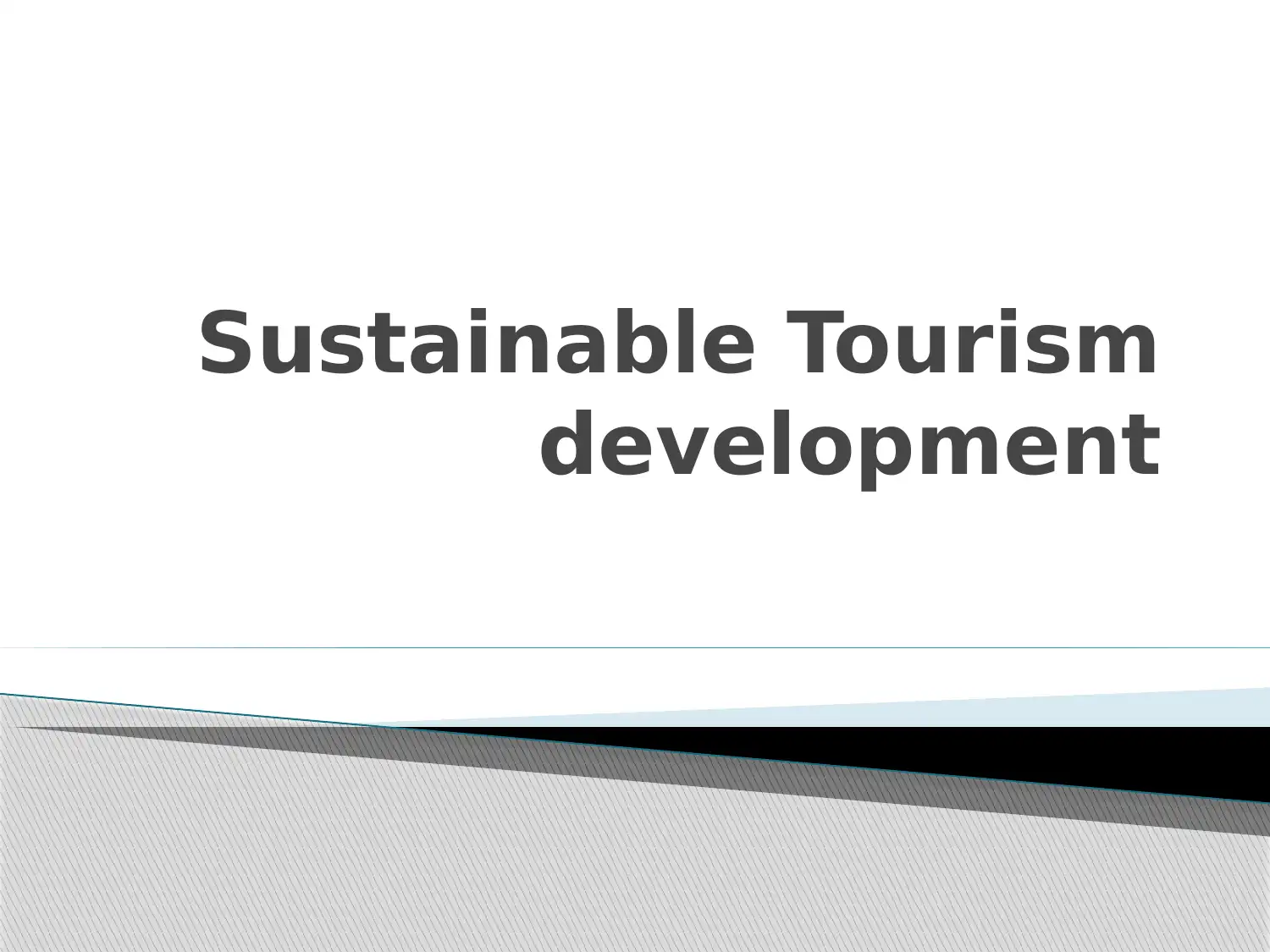
Sustainable Tourism
development
development
Paraphrase This Document
Need a fresh take? Get an instant paraphrase of this document with our AI Paraphraser
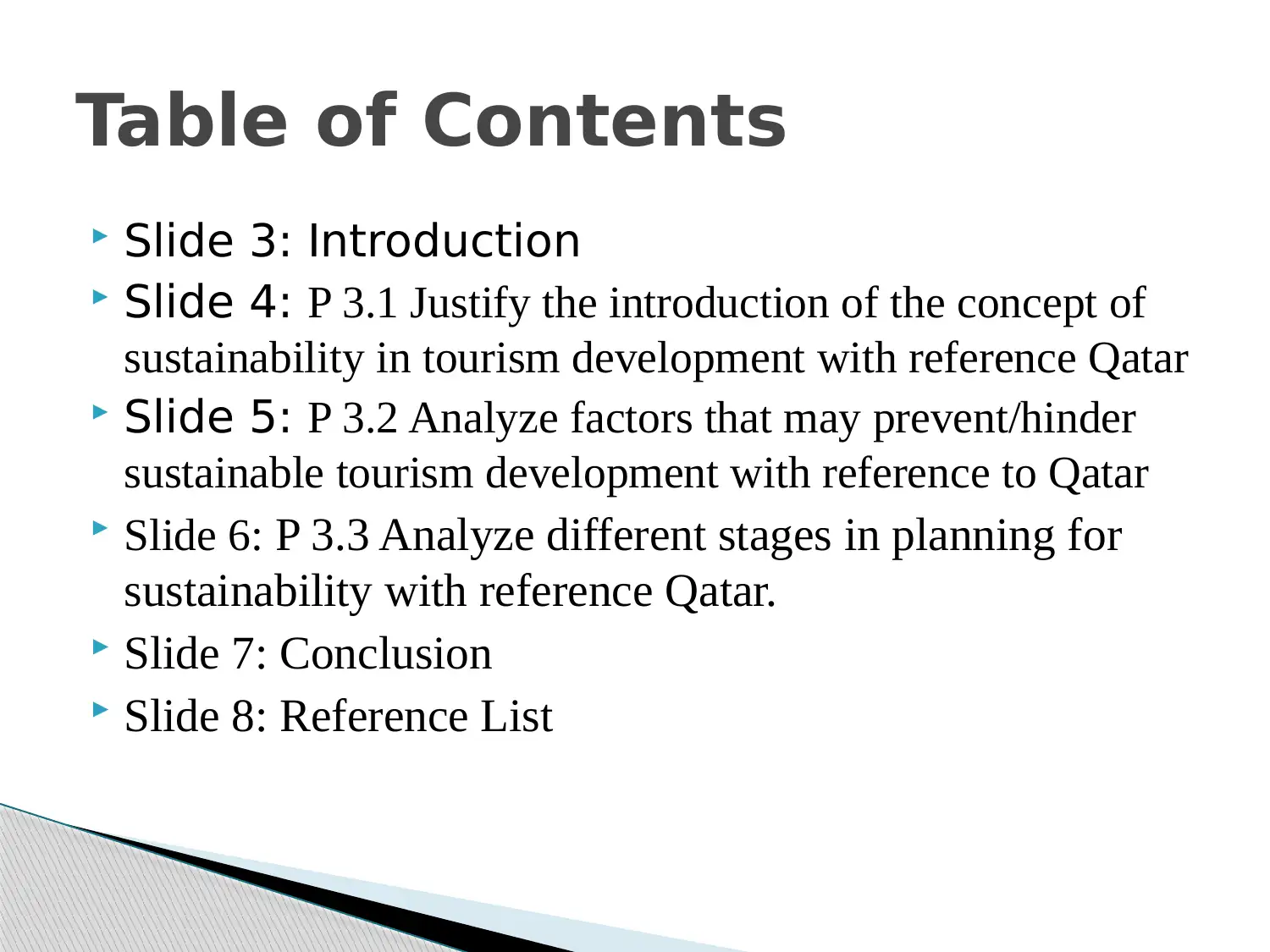
Slide 3: Introduction
Slide 4: P 3.1 Justify the introduction of the concept of
sustainability in tourism development with reference Qatar
Slide 5: P 3.2 Analyze factors that may prevent/hinder
sustainable tourism development with reference to Qatar
Slide 6: P 3.3 Analyze different stages in planning for
sustainability with reference Qatar.
Slide 7: Conclusion
Slide 8: Reference List
Table of Contents
Slide 4: P 3.1 Justify the introduction of the concept of
sustainability in tourism development with reference Qatar
Slide 5: P 3.2 Analyze factors that may prevent/hinder
sustainable tourism development with reference to Qatar
Slide 6: P 3.3 Analyze different stages in planning for
sustainability with reference Qatar.
Slide 7: Conclusion
Slide 8: Reference List
Table of Contents
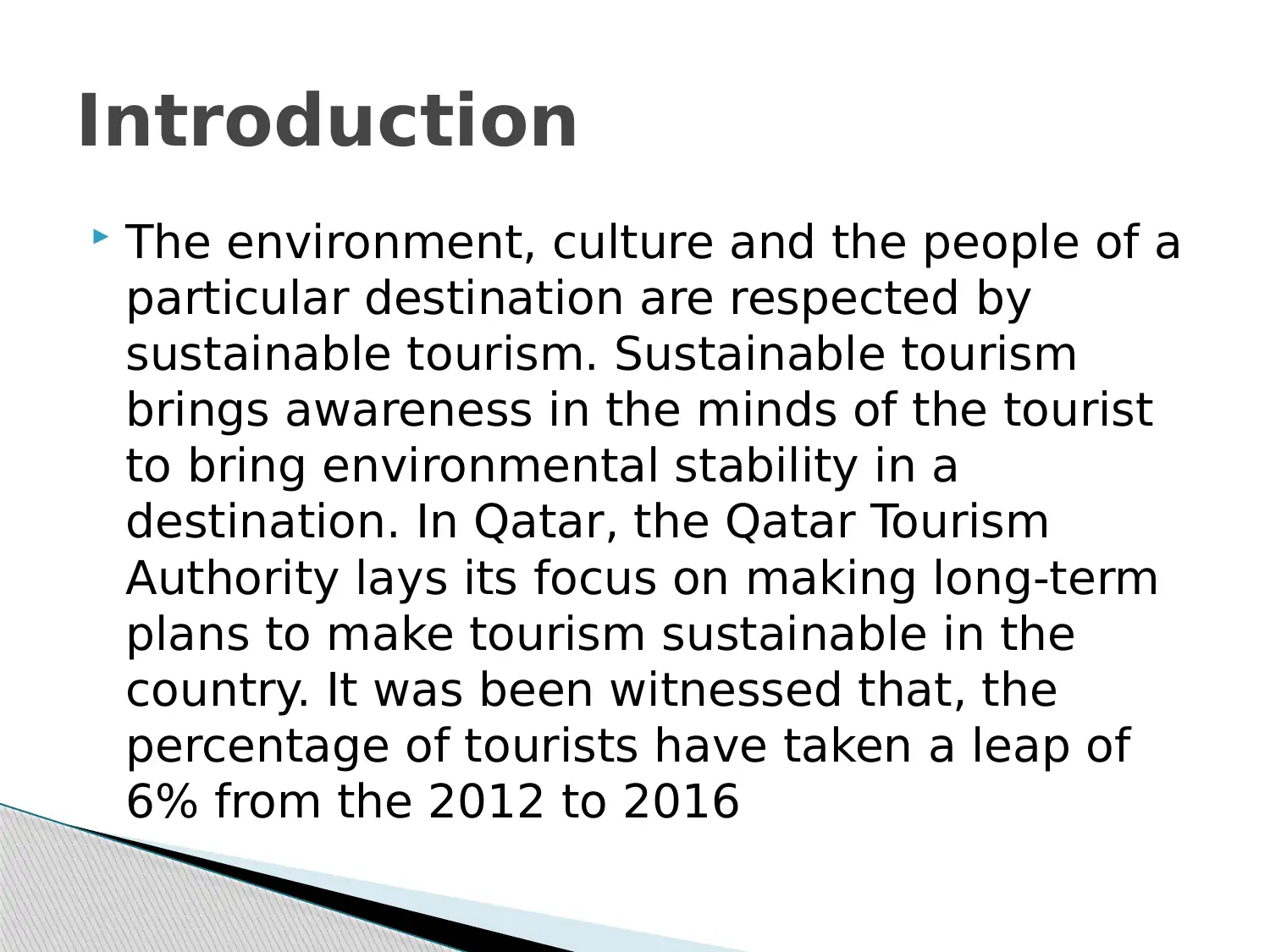
The environment, culture and the people of a
particular destination are respected by
sustainable tourism. Sustainable tourism
brings awareness in the minds of the tourist
to bring environmental stability in a
destination. In Qatar, the Qatar Tourism
Authority lays its focus on making long-term
plans to make tourism sustainable in the
country. It was been witnessed that, the
percentage of tourists have taken a leap of
6% from the 2012 to 2016
Introduction
particular destination are respected by
sustainable tourism. Sustainable tourism
brings awareness in the minds of the tourist
to bring environmental stability in a
destination. In Qatar, the Qatar Tourism
Authority lays its focus on making long-term
plans to make tourism sustainable in the
country. It was been witnessed that, the
percentage of tourists have taken a leap of
6% from the 2012 to 2016
Introduction
⊘ This is a preview!⊘
Do you want full access?
Subscribe today to unlock all pages.

Trusted by 1+ million students worldwide
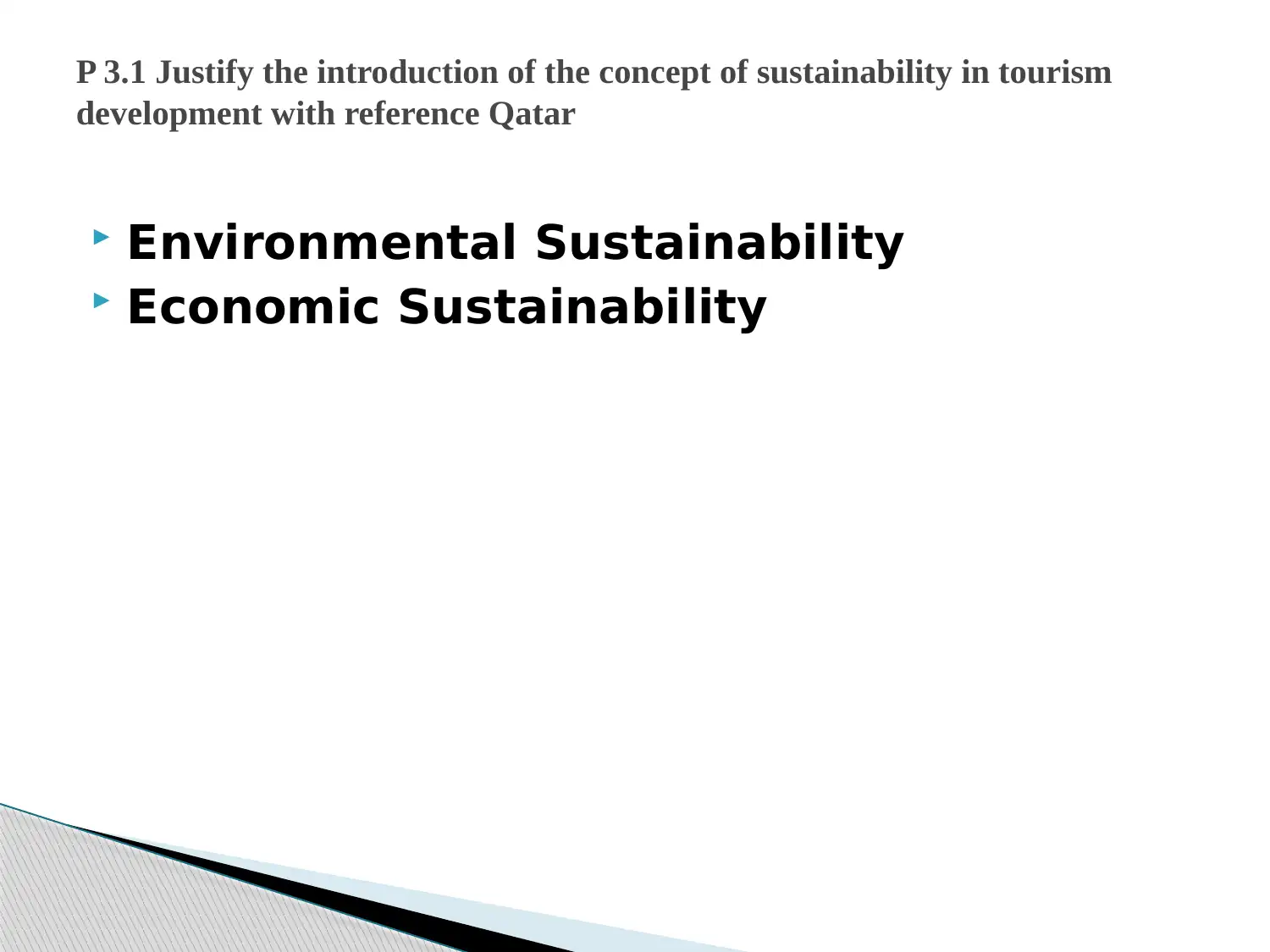
Environmental Sustainability
Economic Sustainability
P 3.1 Justify the introduction of the concept of sustainability in tourism
development with reference Qatar
Economic Sustainability
P 3.1 Justify the introduction of the concept of sustainability in tourism
development with reference Qatar
Paraphrase This Document
Need a fresh take? Get an instant paraphrase of this document with our AI Paraphraser
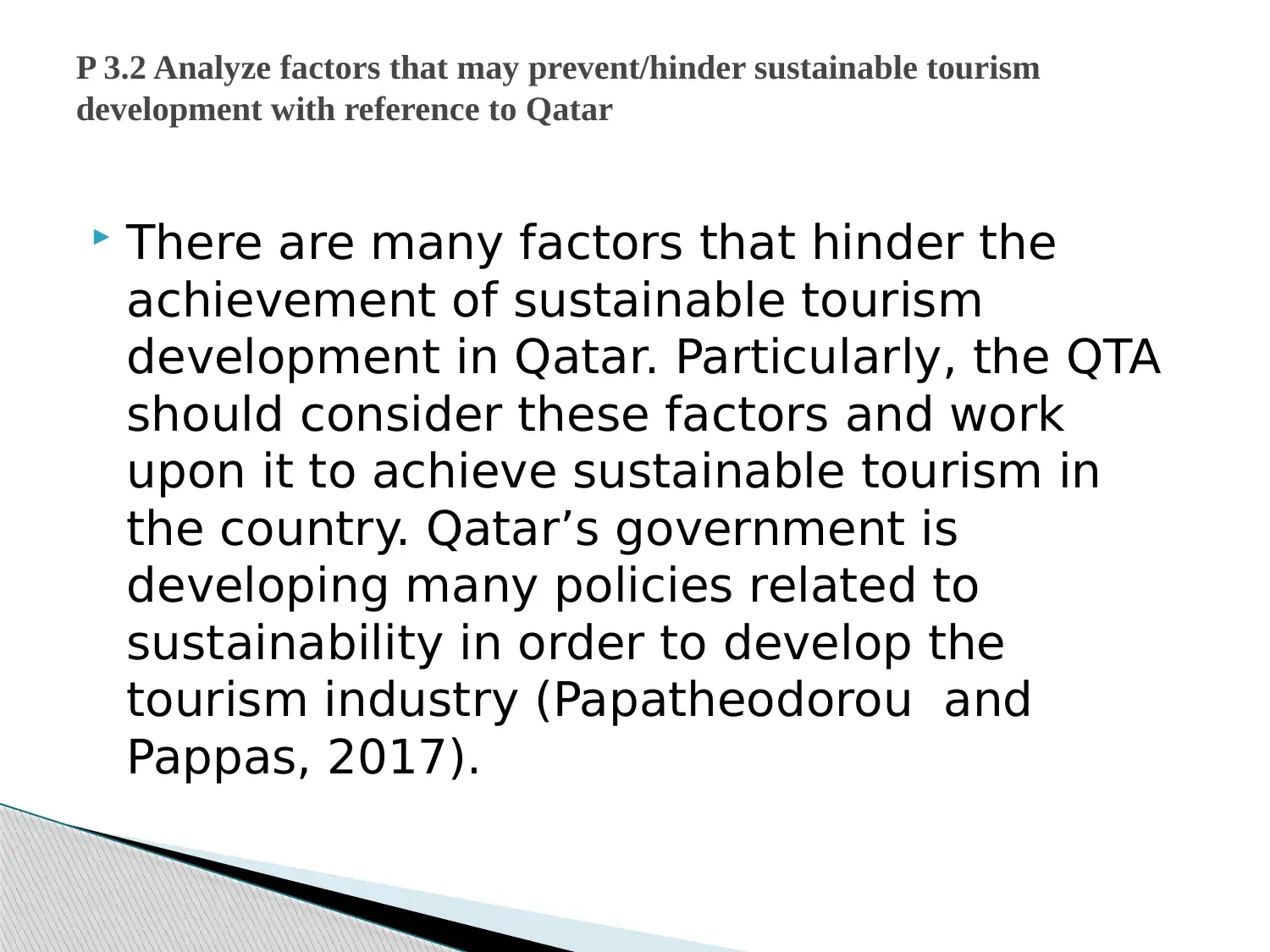
There are many factors that hinder the
achievement of sustainable tourism
development in Qatar. Particularly, the QTA
should consider these factors and work
upon it to achieve sustainable tourism in
the country. Qatar’s government is
developing many policies related to
sustainability in order to develop the
tourism industry (Papatheodorou and
Pappas, 2017).
P 3.2 Analyze factors that may prevent/hinder sustainable tourism
development with reference to Qatar
achievement of sustainable tourism
development in Qatar. Particularly, the QTA
should consider these factors and work
upon it to achieve sustainable tourism in
the country. Qatar’s government is
developing many policies related to
sustainability in order to develop the
tourism industry (Papatheodorou and
Pappas, 2017).
P 3.2 Analyze factors that may prevent/hinder sustainable tourism
development with reference to Qatar
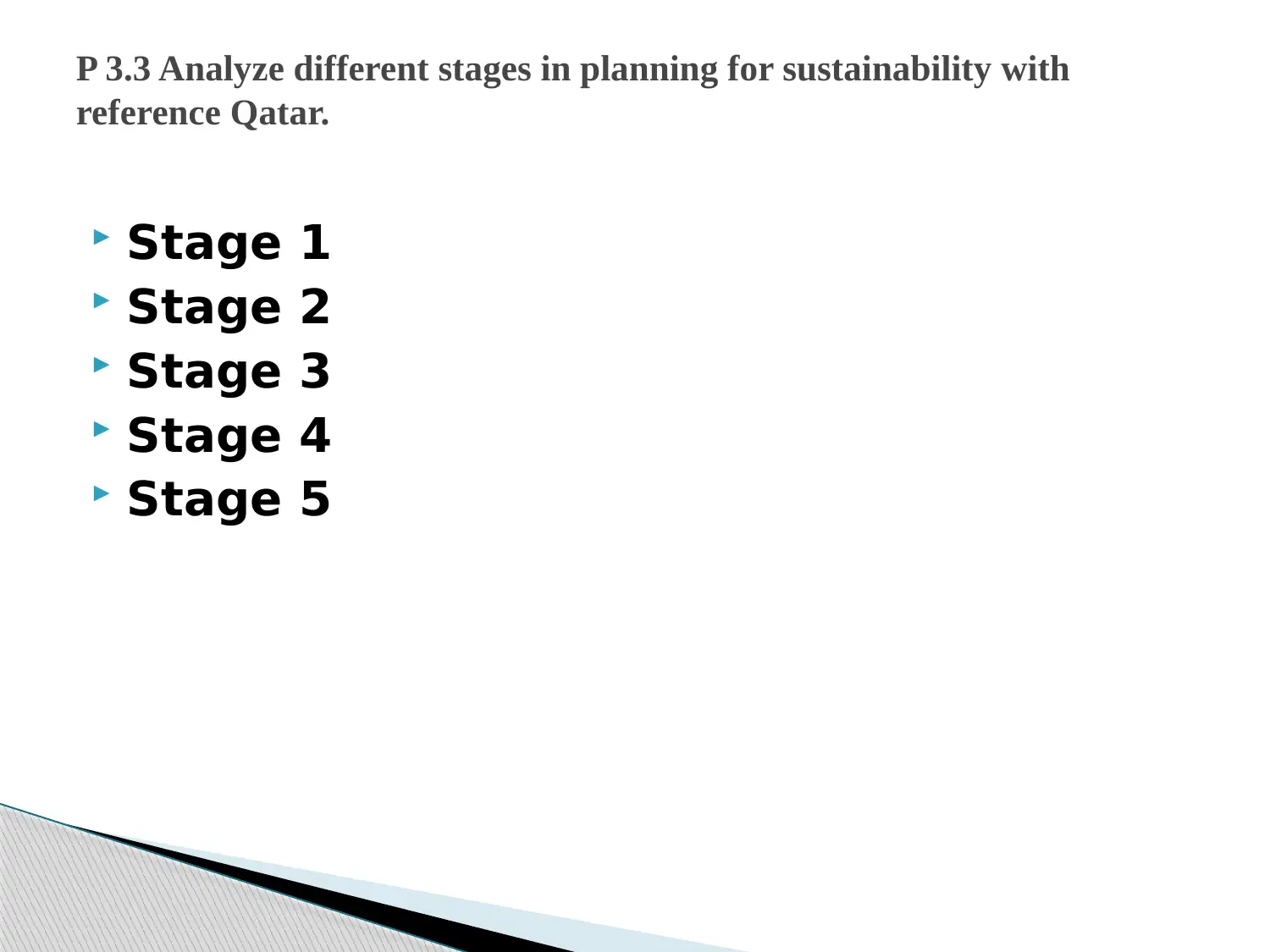
Stage 1
Stage 2
Stage 3
Stage 4
Stage 5
P 3.3 Analyze different stages in planning for sustainability with
reference Qatar.
Stage 2
Stage 3
Stage 4
Stage 5
P 3.3 Analyze different stages in planning for sustainability with
reference Qatar.
⊘ This is a preview!⊘
Do you want full access?
Subscribe today to unlock all pages.

Trusted by 1+ million students worldwide
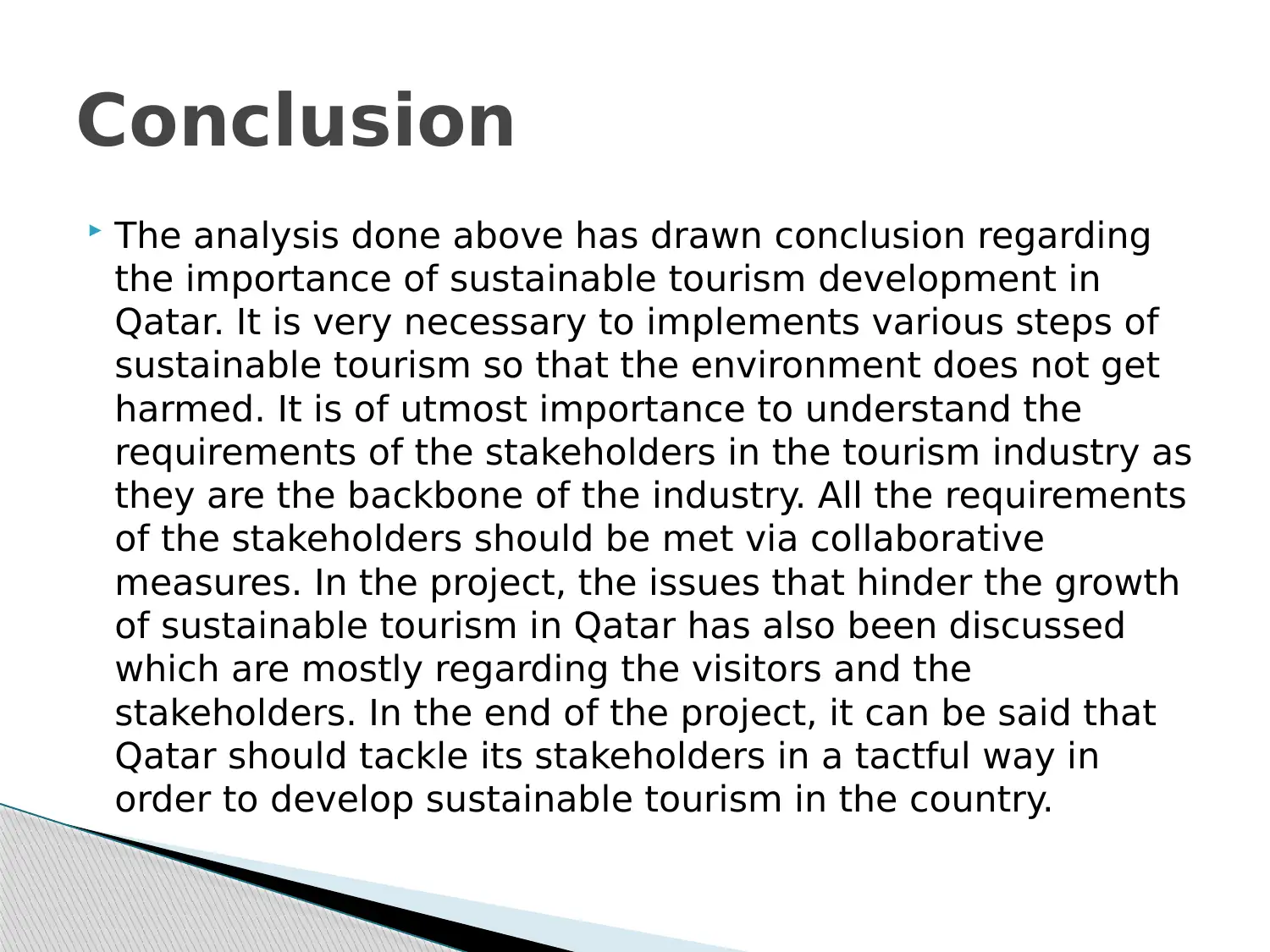
The analysis done above has drawn conclusion regarding
the importance of sustainable tourism development in
Qatar. It is very necessary to implements various steps of
sustainable tourism so that the environment does not get
harmed. It is of utmost importance to understand the
requirements of the stakeholders in the tourism industry as
they are the backbone of the industry. All the requirements
of the stakeholders should be met via collaborative
measures. In the project, the issues that hinder the growth
of sustainable tourism in Qatar has also been discussed
which are mostly regarding the visitors and the
stakeholders. In the end of the project, it can be said that
Qatar should tackle its stakeholders in a tactful way in
order to develop sustainable tourism in the country.
Conclusion
the importance of sustainable tourism development in
Qatar. It is very necessary to implements various steps of
sustainable tourism so that the environment does not get
harmed. It is of utmost importance to understand the
requirements of the stakeholders in the tourism industry as
they are the backbone of the industry. All the requirements
of the stakeholders should be met via collaborative
measures. In the project, the issues that hinder the growth
of sustainable tourism in Qatar has also been discussed
which are mostly regarding the visitors and the
stakeholders. In the end of the project, it can be said that
Qatar should tackle its stakeholders in a tactful way in
order to develop sustainable tourism in the country.
Conclusion
Paraphrase This Document
Need a fresh take? Get an instant paraphrase of this document with our AI Paraphraser
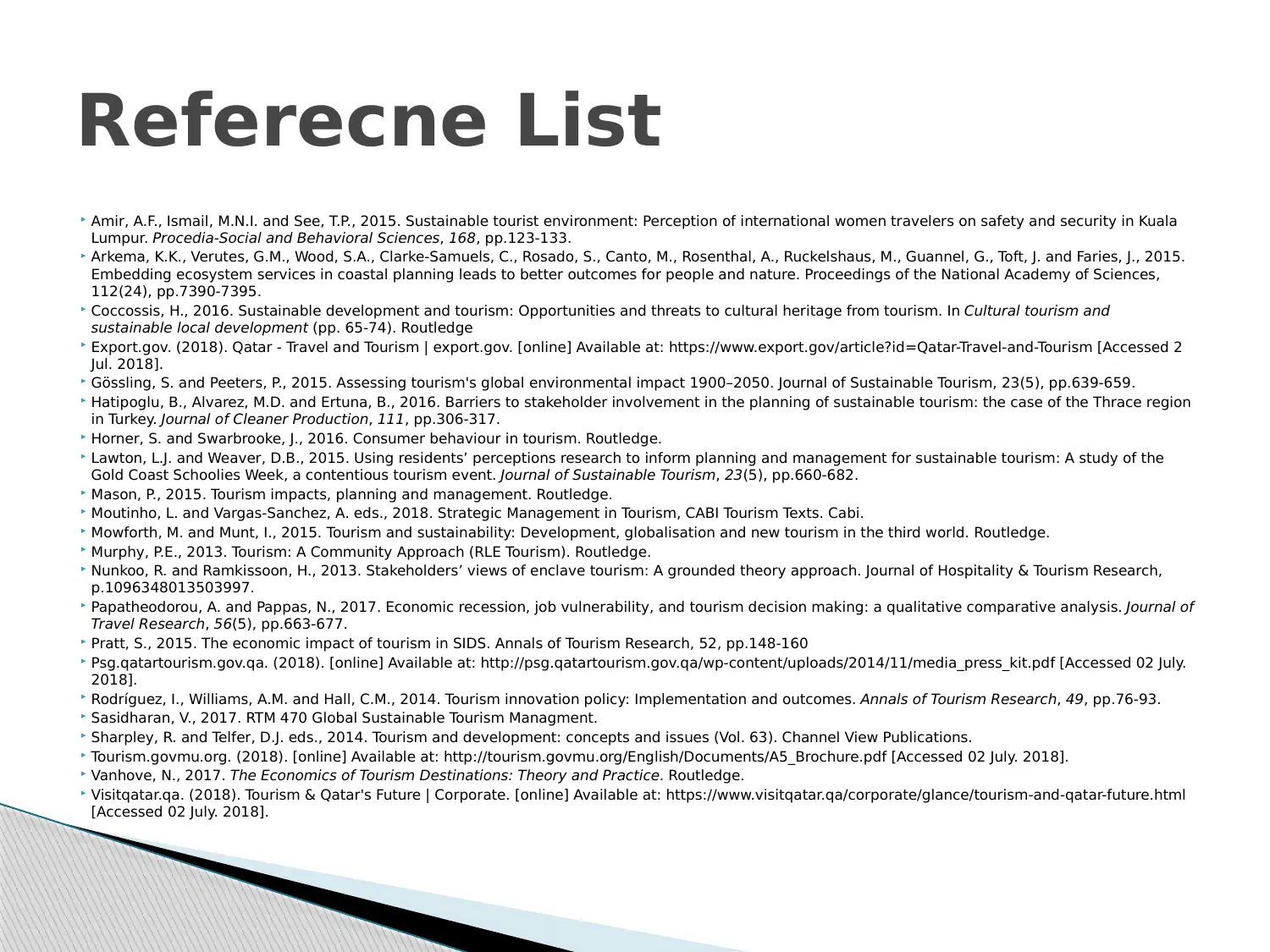
Amir, A.F., Ismail, M.N.I. and See, T.P., 2015. Sustainable tourist environment: Perception of international women travelers on safety and security in Kuala
Lumpur. Procedia-Social and Behavioral Sciences, 168, pp.123-133.
Arkema, K.K., Verutes, G.M., Wood, S.A., Clarke-Samuels, C., Rosado, S., Canto, M., Rosenthal, A., Ruckelshaus, M., Guannel, G., Toft, J. and Faries, J., 2015.
Embedding ecosystem services in coastal planning leads to better outcomes for people and nature. Proceedings of the National Academy of Sciences,
112(24), pp.7390-7395.
Coccossis, H., 2016. Sustainable development and tourism: Opportunities and threats to cultural heritage from tourism. In Cultural tourism and
sustainable local development (pp. 65-74). Routledge
Export.gov. (2018). Qatar - Travel and Tourism | export.gov. [online] Available at: https://www.export.gov/article?id=Qatar-Travel-and-Tourism [Accessed 2
Jul. 2018].
Gössling, S. and Peeters, P., 2015. Assessing tourism's global environmental impact 1900–2050. Journal of Sustainable Tourism, 23(5), pp.639-659.
Hatipoglu, B., Alvarez, M.D. and Ertuna, B., 2016. Barriers to stakeholder involvement in the planning of sustainable tourism: the case of the Thrace region
in Turkey. Journal of Cleaner Production, 111, pp.306-317.
Horner, S. and Swarbrooke, J., 2016. Consumer behaviour in tourism. Routledge.
Lawton, L.J. and Weaver, D.B., 2015. Using residents’ perceptions research to inform planning and management for sustainable tourism: A study of the
Gold Coast Schoolies Week, a contentious tourism event. Journal of Sustainable Tourism, 23(5), pp.660-682.
Mason, P., 2015. Tourism impacts, planning and management. Routledge.
Moutinho, L. and Vargas-Sanchez, A. eds., 2018. Strategic Management in Tourism, CABI Tourism Texts. Cabi.
Mowforth, M. and Munt, I., 2015. Tourism and sustainability: Development, globalisation and new tourism in the third world. Routledge.
Murphy, P.E., 2013. Tourism: A Community Approach (RLE Tourism). Routledge.
Nunkoo, R. and Ramkissoon, H., 2013. Stakeholders’ views of enclave tourism: A grounded theory approach. Journal of Hospitality & Tourism Research,
p.1096348013503997.
Papatheodorou, A. and Pappas, N., 2017. Economic recession, job vulnerability, and tourism decision making: a qualitative comparative analysis. Journal of
Travel Research, 56(5), pp.663-677.
Pratt, S., 2015. The economic impact of tourism in SIDS. Annals of Tourism Research, 52, pp.148-160
Psg.qatartourism.gov.qa. (2018). [online] Available at: http://psg.qatartourism.gov.qa/wp-content/uploads/2014/11/media_press_kit.pdf [Accessed 02 July.
2018].
Rodríguez, I., Williams, A.M. and Hall, C.M., 2014. Tourism innovation policy: Implementation and outcomes. Annals of Tourism Research, 49, pp.76-93.
Sasidharan, V., 2017. RTM 470 Global Sustainable Tourism Managment.
Sharpley, R. and Telfer, D.J. eds., 2014. Tourism and development: concepts and issues (Vol. 63). Channel View Publications.
Tourism.govmu.org. (2018). [online] Available at: http://tourism.govmu.org/English/Documents/A5_Brochure.pdf [Accessed 02 July. 2018].
Vanhove, N., 2017. The Economics of Tourism Destinations: Theory and Practice. Routledge.
Visitqatar.qa. (2018). Tourism & Qatar's Future | Corporate. [online] Available at: https://www.visitqatar.qa/corporate/glance/tourism-and-qatar-future.html
[Accessed 02 July. 2018].
Referecne List
Lumpur. Procedia-Social and Behavioral Sciences, 168, pp.123-133.
Arkema, K.K., Verutes, G.M., Wood, S.A., Clarke-Samuels, C., Rosado, S., Canto, M., Rosenthal, A., Ruckelshaus, M., Guannel, G., Toft, J. and Faries, J., 2015.
Embedding ecosystem services in coastal planning leads to better outcomes for people and nature. Proceedings of the National Academy of Sciences,
112(24), pp.7390-7395.
Coccossis, H., 2016. Sustainable development and tourism: Opportunities and threats to cultural heritage from tourism. In Cultural tourism and
sustainable local development (pp. 65-74). Routledge
Export.gov. (2018). Qatar - Travel and Tourism | export.gov. [online] Available at: https://www.export.gov/article?id=Qatar-Travel-and-Tourism [Accessed 2
Jul. 2018].
Gössling, S. and Peeters, P., 2015. Assessing tourism's global environmental impact 1900–2050. Journal of Sustainable Tourism, 23(5), pp.639-659.
Hatipoglu, B., Alvarez, M.D. and Ertuna, B., 2016. Barriers to stakeholder involvement in the planning of sustainable tourism: the case of the Thrace region
in Turkey. Journal of Cleaner Production, 111, pp.306-317.
Horner, S. and Swarbrooke, J., 2016. Consumer behaviour in tourism. Routledge.
Lawton, L.J. and Weaver, D.B., 2015. Using residents’ perceptions research to inform planning and management for sustainable tourism: A study of the
Gold Coast Schoolies Week, a contentious tourism event. Journal of Sustainable Tourism, 23(5), pp.660-682.
Mason, P., 2015. Tourism impacts, planning and management. Routledge.
Moutinho, L. and Vargas-Sanchez, A. eds., 2018. Strategic Management in Tourism, CABI Tourism Texts. Cabi.
Mowforth, M. and Munt, I., 2015. Tourism and sustainability: Development, globalisation and new tourism in the third world. Routledge.
Murphy, P.E., 2013. Tourism: A Community Approach (RLE Tourism). Routledge.
Nunkoo, R. and Ramkissoon, H., 2013. Stakeholders’ views of enclave tourism: A grounded theory approach. Journal of Hospitality & Tourism Research,
p.1096348013503997.
Papatheodorou, A. and Pappas, N., 2017. Economic recession, job vulnerability, and tourism decision making: a qualitative comparative analysis. Journal of
Travel Research, 56(5), pp.663-677.
Pratt, S., 2015. The economic impact of tourism in SIDS. Annals of Tourism Research, 52, pp.148-160
Psg.qatartourism.gov.qa. (2018). [online] Available at: http://psg.qatartourism.gov.qa/wp-content/uploads/2014/11/media_press_kit.pdf [Accessed 02 July.
2018].
Rodríguez, I., Williams, A.M. and Hall, C.M., 2014. Tourism innovation policy: Implementation and outcomes. Annals of Tourism Research, 49, pp.76-93.
Sasidharan, V., 2017. RTM 470 Global Sustainable Tourism Managment.
Sharpley, R. and Telfer, D.J. eds., 2014. Tourism and development: concepts and issues (Vol. 63). Channel View Publications.
Tourism.govmu.org. (2018). [online] Available at: http://tourism.govmu.org/English/Documents/A5_Brochure.pdf [Accessed 02 July. 2018].
Vanhove, N., 2017. The Economics of Tourism Destinations: Theory and Practice. Routledge.
Visitqatar.qa. (2018). Tourism & Qatar's Future | Corporate. [online] Available at: https://www.visitqatar.qa/corporate/glance/tourism-and-qatar-future.html
[Accessed 02 July. 2018].
Referecne List
1 out of 8
Related Documents
Your All-in-One AI-Powered Toolkit for Academic Success.
+13062052269
info@desklib.com
Available 24*7 on WhatsApp / Email
![[object Object]](/_next/static/media/star-bottom.7253800d.svg)
Unlock your academic potential
Copyright © 2020–2026 A2Z Services. All Rights Reserved. Developed and managed by ZUCOL.


